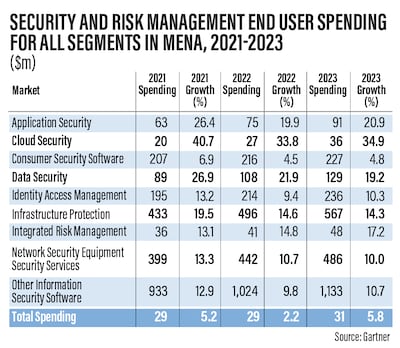Businesses in the Middle East and North Africa region will increase their spending against cyber threats by 11.2 per cent to $2.8 billion in 2022, with cloud infrastructure remaining the most important component to safeguard, the latest study from Gartner said.
End-user spending this year is projected to rise in all segments of information security and risk management, with cloud security poised to record the highest growth at 33.8 per cent and hit $27 million this year.
This is a result of Mena's focus on public cloud growth, intended to streamline its shift to a data-driven economy from an oil-exporting model. It will contribute to the fast growth of these segments, the US research firm said in a report released during its Security and Risk Management Summit on Monday.
"As organisations look to create secure work-from-home environments, they are exploring solutions that offer quick return on investment. As a result, technologies such as end point protection, secure web gateway, web application firewall etcetera, will witness short-term demand at least until 2022," Shailendra Upadhyay, principal research analyst at Gartner, told The National.
"Projects that are capital-intensive and take a long time to complete, such as security information and event management, were put on hold for 2020 but will pick up partially in their original form and partially with a more cloud-oriented focus.”
The coronavirus pandemic accelerated digital transformation and adoption, which were the primary growth drivers for the overall cloud market, as organisations hurried to support remote workers and serve the unprecedented demand from users.
This, in turn, became an opportunity to grow cyber crime, one of the biggest concerns in a rapidly advancing digital world as criminals on the web keep in step with new technologies to develop more sophisticated hacking techniques, leading to economic, financial and reputational damages.

Data breaches or major IT outages worry companies the most, German financial services firm Allianz said in January. The number of ransomware attacks surged by 151 per cent worldwide in the first half of 2021, according to the World Economic Forum's Global Cyber Security Outlook report released last month.
“Cyber attacks have become more sophisticated over the last two years, and the Mena region is not immune,” Mr Upadhyay said. “The malicious nature of the attacks has forced security leaders in the region to relook at their security strategy and increase their security and risk management spending to make their businesses future-ready.”
The region's cyber security market is expected to reach $66.5bn by 2025, growing at a compound annual rate of 15.62 per cent from 2018 to 2025, research firm Report Ocean said. Globally, this market is projected to hit $352.25bn by 2026, from $156.24bn in 2020, according to Mordor Intelligence data.
Mena spending to secure cloud infrastructure – its importance further highlighted in the past two years amid an explosion of remote user demand – is now a constant trend: in 2021, it grew almost 41 per cent to around $20m, and will further rise 35 per cent to $36m in 2023, Gartner said.
Data security is next, projected to grow 22 per cent to $108m in 2022 from $89m in the previous year, followed by application security that is seen to rise 20 per cent to $75m from $63m. Both retained their rankings from 2021, but are expected to switch places in 2023, albeit both growing at roughly a fifth.
In terms of actual value, security services remain on the top, poised to grow almost 10 per cent to $1.02bn this year from $933m in 2021, and a further 10.7 per cent to $1.13bn next year.
At the summit, Tina Nunno, a research vice president and fellow at Gartner, called for an "offensive mindset" which would enable them to focus on innovation and put in place a forward-looking strategy.
“Responsibility for securing the enterprise goes beyond just the security team,” Ms Nunno said. “Transparent, proactive communication across the organisation will help security leaders promote distributed accountability and ensure that stakeholders are delivering on necessary outcomes.”


